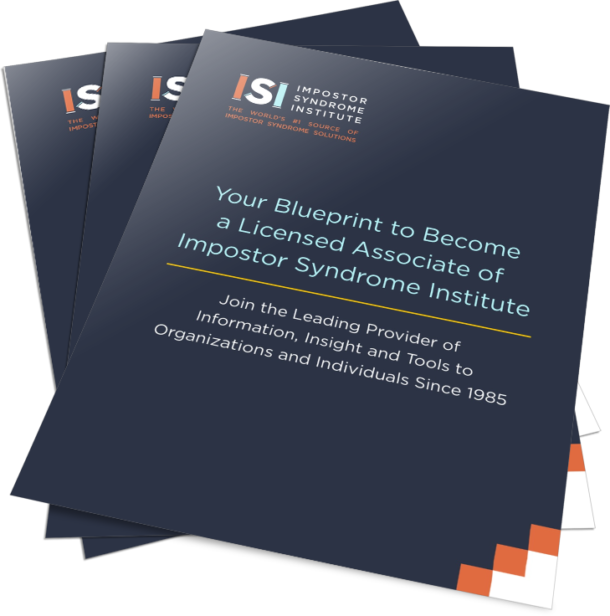From The Executive Female (magazine published by the National Association of Female Executives) March/April 1986
By Valerie Young, Ed.D
Companies as well as individuals pay a high price when achievers secretly feel they have fooled others about their talents. When qualified workers fear risks, get caught in the “expert trap,” and are prone to perfectionism and procrastination, there’s a leak in the corporations human resources pool.
Waste in the Workplace
The Impostor Syndrome, although experienced on an individual level, can and does interfere with the job effectiveness, productivity and advancement potential of those encumbered by it. This should be of great concern to managers because it affects a company’s greatest resource – its employees. The syndrome can become an expensive problem when it results in:
- An untapped labor pool:The men and women who experience “impostor-ism” are less likely to feel qualified for promotions; hence, they are less inclined to compete for advanced positions. They are more apt to fall into the “expert trap,” remaining in jobs in which they are comfortable and knowledgeable, but have clearly outgrown.
- Employees reluctant to take risks: Impostors are more reluctant to pursue new ideas and to take business risks which could benefit their companies, and more reticent about offering potentially valuable insights, ideas, opinions and solutions to problems because they fear being wrong or exposing their “ignorance.”
- Procrastination: They are also more prone to production-delaying procrastination; “putting off’ is a coping mechanism which allows them to postpone the moment of awful “truth,” finding out that they can’t complete a project satisfactorily.
- Employee stress: The anxiety of expecting to be “unmasked” can cause stress-related problems. Billions of dollars are wasted on its symptoms: low productivity, absenteeism, haphazard communication, below-par performance and sickness (studies show that people under stress are more vulnerable to disease).
In addition, employees caught in the Impostor Syndrome are also more likely to see constructive criticism as proof of their ineptitude, rather than use it to improve their skills or increase their knowledge. And, in turn, they are not as motivated by praise and positive feedback because they dismiss compliments, crediting their accomplishments to luck, charm ( “they’re just saying that because they like me”) and/or the effort of others (if someone else helped, the achievement doesn’t count).
From Loss to Profit
You, as a manager, should try to assess the extent to which the impostor phenomenon exists in your company, and also try to determine how your organization’s corporate culture may contribute to the problem. This is an issue, which must be handled sensitively; it would be threatening and counterproductive to call a meeting and ask people who feel they’re faking their way through their jobs to raise their hands.
One corporate vice president used an informal, non-accusatory approach that prompted people to respond honestly. After passing around an article on the Impostor Syndrome, he followed up with one-to-one chats, saying, “Hey, I thought that article was on target. What do you think?” Among other things, he discovered that his assistant often put more effort into a task than it warranted. For instance, when asked to jot down a few thoughts on an upcoming agenda topic, she prepared a letter-perfect full report. Her perfectionism wasted time and talent that could have been used more productively.
Other managers have distributed the assessment tools Clance and Imes included in The Impostor Phenomenon, which were designed to measure the degree to which individuals experience “faking” feelings. To ensure candor and cooperation, such tools should be completed anonymously, voluntarily, and participants should be told why they are being given the tool and how you will use the data.
Managers, with staff help, can also develop an organizational profile, which reflects how employees experience their company’s “achievement climate.” This should be an honest examination of the ways management may be contributing to the problem. (In many cases, it is less threatening and more productive for an experienced consultant to gather this information and follow up with actions that fit the organization’s specific needs.)
Questions to explore include:
1) How does your organization view mistakes, unsuccessful risks, failure and being wrong? Are mistakes and failures considered human and inevitable? Are employees encouraged to learn from mistakes and failures, or are they penalized for them? Do employees have the right to be wrong on occasion, to have an “off’ day or to work at honing less-developed skills? Are they encouraged to collaborate on enterprises so that consequences of risks are shared?
2) Is asking for help – or even information – considered a sign of weakness or a legitimate request? Is admitting a gap in knowledge seen as normal and necessary for learning, or a sign of incompetence? Is perfectionism the unspoken rule?
To take your inquiry one step further, consider whether your organization recognizes and addresses the uniqueness of women’s experience in the workplace. Research has shown that some women lower their expectations for future successes following a setback; do supervisors encourage and support them at these times? And, because people are prone to self-doubts in new situations, particularly when pioneering in an area, are women who are the first in a department or job given appropriate training and support? In addition, is your organization aware of the “outsider” status many women in non-traditional jobs experience, and the pressures on women to be model representatives of their sex?
Because of sexism and the credibility gap created by societal assumptions about women’s capabilities and appropriate roles, women must outperform or collect more credentials than their male counterparts in order to succeed. Is your company sympathetic to the ways sex-role stereotyping reinforces women’s insecurities about their abilities and forces them to continually prove their competence in a male-dominated business world? Does management understand and acknowledge the various ways people discount, ignore or trivialize women’s accomplishments? Is there an attitude among some supervisors that women must “earn” the right to hold their jobs?
Because old attitudes about female roles and talents die hard, women are often treated too harshly. In your organization, are women’s mistakes or weak spots scrutinized more closely or judged more severely? Are male and female supervisors unnecessarily hard on women staffers to prove that they’re not catering to women? Are women given more challenging assignments than men to “test” their capabilities?
For the same reason, women may be handled gingerly – with “kid gloves.” In your company, are they unconsciously discouraged from taking risks, given less challenging assignments or prematurely “rescued” from tough assignments? Is criticism soft-pedaled or withheld for fear of upsetting female employees?
And does your company have an unspoken but obvious double standard? Is making a mistake or getting egg on one’s face more acceptable for male than female employees? Is tooting one’s own horn perceived differently when done by men and women? Is asking for assistance or information taken as a sign of a woman’s incompetence? Is the poor performance of one woman, especially if she is the first in her position, considered evidence that a woman can’t handle the job?
A Plan for Action
If an honest appraisal of your organization uncovered some areas needing improvement, and your goal is to create a work environment for all your employees, which is both supportive and conducive to productivity, consider making some of the following changes. You and other managers who want to reduce the negative impact of the Impostor Syndrome on your organization can:
- First and foremost, provide a safe forum for employees to discuss concerns and insecurities.
- Acknowledge the ways that the corporate culture and management’s attitudes and standards may be contributing to the problem.
- Explore, with female staffers, the ways they feel supported or undermined.
- Disclose, when appropriate, your own fears and doubts about work, and indicate that you, too, occasionally have off days. People are often surprised to learn that those they look up to sometimes feel nervous or make mistakes. When leaders share their own human uncertainties, it teaches others that competence – even at high levels – doesn’t demand perfection, only the ability and willingness to learn.
- Invite women with whom you have good rapport to share how they dealt with stereotypes they have encountered on the job, and relate how their abilities, competence and roles as females are perceived (for example, women are supposed to make the coffee and listen to everyone’s personal problems; they are not supposed to show up male co-workers or be the CEO). Being frustrated or stymied by stereotyping means women have less energy to focus on getting the job done. If you are a male supervisor, be careful not to minimize or discount women’s experiences or become defensive; you asked them to talk and it is up to you to listen.
- Whether you are a male or female manager, honestly examine the stereotypes you hold about women. By monitoring your own language and behavior, you can be an anti-sexist role model. Then, gently but firmly confront others when you observe sexist behavior.
- Help staff members learn to delegate, to let go of routine tasks they insist on completing due to perfectionistic tendencies. In many aspects of our jobs, an adequate performance is all that is required; there is no need to waste time on petty details.
- Stay alert to self-defeating patterns you observe in others, such as when women preface their sentences with such classic disclaimers as, “this probably isn’t right, but…” or “this is probably a dumb question, but…” or brush off praise with “anybody could have done it” or “it wasn’t much.” When you hear these kinds of self put-downs, call the person on her negative thinking.
- Encourage employees to take risks; promote the notion that there is no shame in failing as long as everyone gives it their best shot. Make sure adequate resources and support are available so no one is set up to fail.
- Emphasize the learning value of mistakes. Failing or making mistakes is a signal to practice more, to develop skills, to improve performance, to do whatever is required to correct past errors. This kind of positive thinking motivates workers to persevere despite blunders or setbacks.
- When criticizing an individual’s performance, make it clear that you want to guide him to correct poor habits, not ridicule or blame.
- When you must criticize, emphasize strong points before discussing weak areas. For example, say, “That report you turned in really reflected a lot of insight and effort, yet it requires some major revisions which I’m confident you can deliver.” When mixed feedback is given, ask the receiver to repeat what he or she has heard. This is especially important because the impostor is apt to hear, “so you’re saying I can’t write,” and will weed out the positive and focus on the negative.
- Build self-confidence by praising employees for a job well done; this is especially important because impostors are typically unable to pat their own backs. This kind of reinforcement can help them take credit for their accomplishments and skills, and encourage them to continue improving their performance.
- Emphasize, in evaluation and promotion decisions, that job proficiency is more a matter of acquiring or expanding skills and knowledge than a function of innate ability. Let employees know you define competence as having what it takes to learn.
- Become, and remain, aware of how other people’s behavior can undercut a woman’s self-confidence and effectiveness. Complaints often voiced by women include: men interrupting or ignoring them when they speak (studies show that men do this to women 90 percent more often than the reverse), digs about a woman being an affirmative-action hiree, exclusionary kinds of male camaraderie, etc. Most put-downs are subtle but nonetheless demoralizing. Discourage such behavior among colleagues and subordinates, monitor your own sexist actions and be sympathetic to female staffers who encounter this behavior.
- Try to minimize organizational pressures on women. Don’t set a woman up as the boss of an all-male team; instead, put more women on the team. Recognize and factor in the societal pressures that squeeze women between work, and family responsibilities. Instead of penalizing someone who has to leave work to care for a sick child, devise organizational strategies that ease the strain on employees with children.
Finally, for any effort to be lasting and profitable, more substantive and systemic changes need to occur. My suggestions: set up a task force to study and make recommendations about how to address Impostor Syndrome problems; start programs to teach managers how to recognize and counteract the negative impact of the syndrome; provide training in how to fully develop and use female employees’ capabilities; promote professional women’s networks; make an organizational commitment to day care; conduct in-house training programs for promising employees who need to build their confidence; and establish a formal or informal mentor system.
It is up to managers and companies – and in their best interests – to develop and support those intelligent, talented employees who, despite proof to the contrary, continue to doubt their competence. Conquer the Impostor Syndrome, and you will create a brighter, more profitable work environment.


